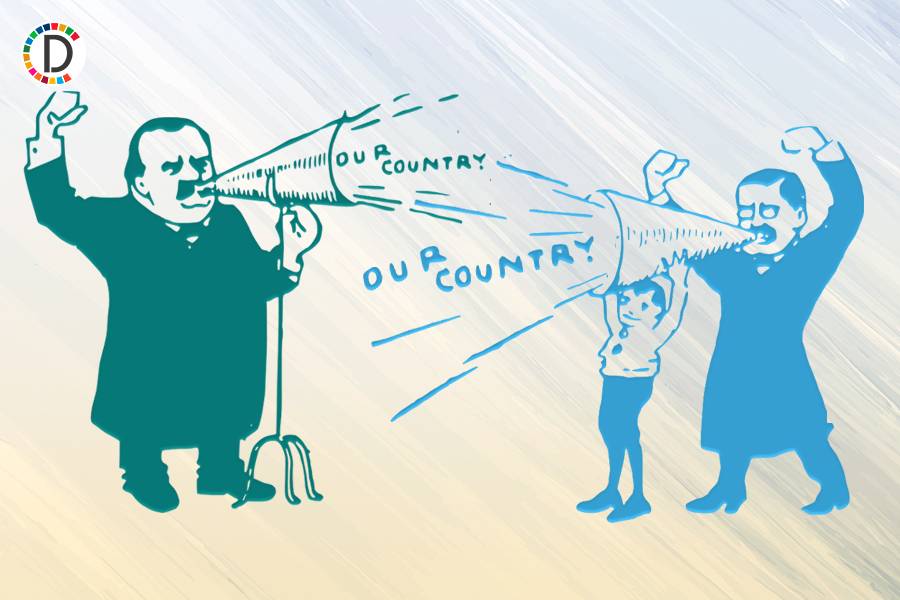EU, US urge Georgia to halt ‘foreign agents’ bill as protests continue
Parliament on Wednesday approved the second reading of the bill, which the opposition says is modelled on a law the Kremlin has used to crack down on opponents in Russia. Debates on Thursday were cancelled after what officials called an "attack" on the legislature.

The European Union and U.S. on Thursday condemned legislation making its way through Georgia's parliament on "foreign agents" and thousands of protesters snarled traffic in the capital with a peaceful protest against the bill. The bill would require organisations receiving more than 20% of their funding from abroad to register as agents of foreign influence, a requirement opponents attack as authoritarian and Kremlin-inspired.
The bill has completed two of three readings in the parliament, and the latest Washington and Brussels comments reflected alarm over the country's future direction. Protesters poured into Heroes' Square, a key roundabout through which much of Tbilisi's traffic passes between the city's neighbourhoods. Long queues of vehicles remained blocked.
There was no visible police presence at the gathering, focused on a mass participation folk dance and patriotic songs in the centre of the roundabout and no sign of the violence of earlier protests outside parliament. Police fired tear gas and stun grenades to clear some of the protesters on Tuesday and Wednesday.
Demonstrators showed no sign of backing down. "Georgian civil society has never been so strong," Nina Bakhtadze, 26, said at the gathering on the roundabout.
"We are against an autocratic regime and we will never give up, especially Georgian youth is very confident and we will fight till the end, till the win." The ruling Georgian Dream party says the law is needed to ensure transparency.
The party's billionaire founder said this week that Georgia must defend its sovereignty against Western attempts to dictate to it. Crowds have protested nightly for weeks outside the parliament in Tbilisi. Inside, lawmakers have come to blows.
A WIDER STRUGGLE OVER GEORGIA'S DIRECTION The standoff is seen as part of a wider struggle that could determine whether Georgia, a country of 3.7 million people that has experienced war and revolution since the fall of the Soviet Union, moves closer towards Europe or back under Moscow's influence.
Gert Jan Koopman, director general of the European Commission's enlargement directorate, reiterated the EU's warning that the bill would put at risk Georgia's hopes of becoming a member of the bloc. "There are concerning developments in terms of legislation. The law ... as it stands is unacceptable and will create serious obstacles for the EU accession path," he told a news conference in Tbilisi.
But the government - which withdrew a similar law last year in the face of protests - has shown no sign it will climb down a second time ahead of a parliamentary election in October. Britain, Italy, Germany and the U.S. have also criticised the bill.
The White House expressed concerns about the effect such legislation could have on Georgians' willingness to speak out. "We are deeply concerned about this legislation - what it could do in terms of stifling dissent and free speech," White House national security spokesperson John Kirby said at a briefing.
U.S. Ambassador Robin Dunnigan said the government's choices "have moved the country away from its Euro-Atlantic future" and called for a new pledge to integration with the West. In a statement, Dunnigan said senior U.S. leaders had invited Georgia to discuss the issue, but that the country had not accepted the offer.
Georgia's Foreign Ministry said Prime Minister Irakli Kobakhidze had decided against such a visit as the invitation was contingent on suspending debate on the legislation. This, it said, was at variance with a spirit of partnership. Parliament on Wednesday approved the second reading of the bill, which the opposition says is modelled on a law the Kremlin has used to crack down on opponents in Russia.
Debates on Thursday were cancelled after what officials called an "attack" on the legislature. Lawmakers are expected to give the bill its third and final reading in around two weeks. (Editing by Mark Trevelyan, Gareth Jones, Ron Popeski and Toby Chopra)
(This story has not been edited by Devdiscourse staff and is auto-generated from a syndicated feed.)
- READ MORE ON:
- georgia
- protest
- foreign agents
- european union
- us
- kremlin
- transparency
- democracy
- sovereignty
- dissent
ALSO READ
High Seas Tension: US Strikes Target Narco Vessels amid Political Pressure
Global Celebrations Usher in Hopeful 2026
Highlights of US Current Affairs: From Federal Reserve Policies to Key Legal Battles
PDVSA's Struggle Amid US Sanctions: A Looming Operational Crisis
The Unseen Devastation: Israel's Innovative Use of APCs in Gaza










